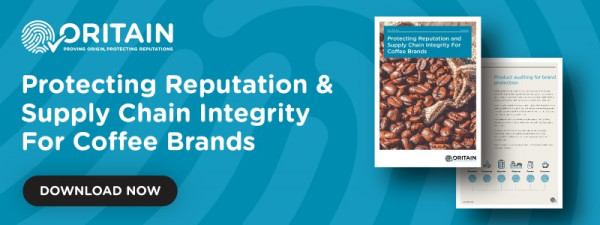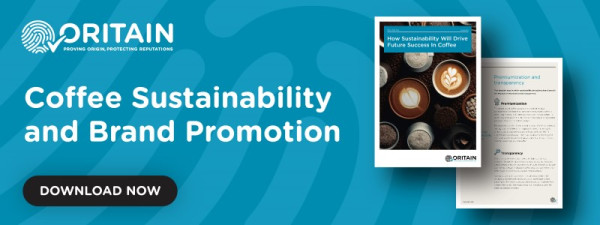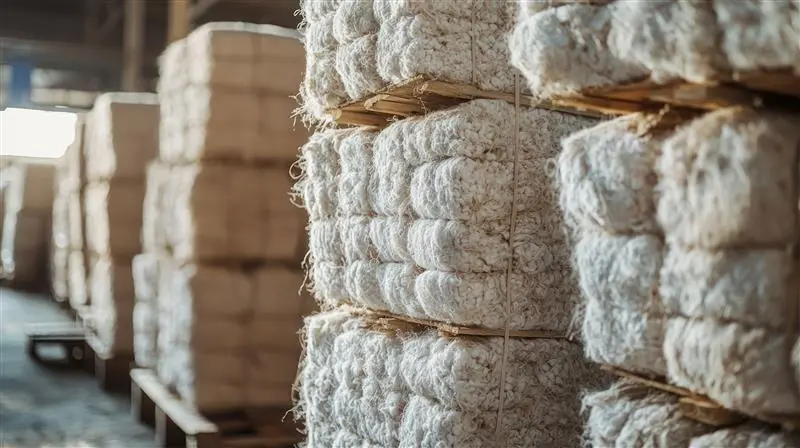Coffee Traceability: Building Brand Protection, Transparency and Consumer Trust
By Gabriela Castro-Fontoura | 8 August 2024
minutes to read.

The world’s love affair with coffee continues to grow – but brings with it both risks and opportunities for coffee brands.
Estimates of the market in 2023 place it as worth between US $126 billion and $138 billion. By 2032, forecast growth of 6.4% would see it worth $237 billion.
In a competitive global market, adulteration and counterfeit products can erode market share and undermine brand reputation.
But consumer and regulatory influences can encourage the innovation that fuels future growth.
The most successful coffee brands of tomorrow will be those that both protect their brand from risk and promote it to maximize opportunity. By finetuning their operations, they will best position themselves to secure coffee brand advantage through scientific traceability.
The growing risk of coffee adulteration and counterfeiting
Coffee production involves lengthy supply chains and multiple intermediaries. Failure to protect supply chain integrity could result in coffee brands having their products adulterated or substituted.
Studies have revealed the proportion of adulteration in coffee samples to be up to 30%.
Deliberate adulteration is motivated by economic objectives, whereby introducing cheap alternatives (such as corn, soy, acai, barley and other crops) into genuine products allows unscrupulous parties to greatly increase per bag profits.
This practice presents significant risks to both coffee companies and the market.
- Reputational risk – When consumers purchase inferior products under a company’s brand name, the appeal of that brand is diminished, brand equity is undermined, and consumer preference can be shifted toward competitors.
- Consumer safety risk – When allergens and non-food products are incorporated it can pose a risk to consumer health, particularly for severe allergy sufferers unknowingly purchasing products where the pack descriptions don’t match the product ingredients.
Coffee product auditing and supply chain transparency
Introducing product auditing and testing enables more effective detection of adulteration. Product traceability programs allow coffee brands to monitor their beans as they move though the supply chain, helping provide assurance of product integrity.
As regulation intensifies across the industry, the availability of scientific testing methods empowers brands to comply with legislation and have certainty that consumer health isn’t compromised.
Sustainability and ethical coffee production drive growth
Consumer brand preferences are increasing the importance of sustainability in coffee. Among the leading coffee market trends emerging today is a focus on traceable sourcing. Consumers are increasingly demanding visibility across every stage of production, from farming and processing to shipping, roasting and retail.
For coffee brands, a focus on promoting sustainability credentials benefits every party:
- Brands can leverage ESG accolades to increase the value of their products
- Retailers can lift profit margins through pricing based on coffee origin, quality or cupping
- Consumers are willing to pay a premium for coffee they feel good about drinking
- Workers earn better living wages without risk of forced labor through ethical sourcing
Research from McKinsey show that products promoting ESG claims sold for a significant premium over those without.
Premiumization is often linked to point of origin. Coffee connoisseurs will pay more for coffee which originates in areas that are higher in quality, sustainably sourced, and ethically produced. In the UK, 55% of coffee consumers agree that premium coffee is an affordable luxury.
Rather than follow where consumers are now, the opportunity for coffee brands is to lead. By staying ahead of the market and educating consumers on the innovations the brand is making, brands put themselves in pole position for when the market starts to use their purchasing power to drive change.

One example is Nescafé Origens do Brasil, premium coffee beans which are imbued with the unique charm, aromas and sensations only found in special parts of Brazil. Nescafé partnered with Oritain to verify their beans are true to origin through scientific testing. It means that consumers can enjoy great-tasting coffee that’s better for the planet too.
Coffee origin verification to strengthen brand promotion
Sustainability claims will only be believed, and product growth achieved, if claims are scientifically and independently proven. Traceability can verify that:
- Premium products truly originate in high-quality growing regions
- Sustainable products are sourced from areas not affected by deforestation
- Ethically produced products don’t originate in areas known to use forced labor
Such testing provides the product origin verification consumers demand to trust brand claims and reward this trust with their custom. It offers a robust, unimpeachable tool for coffee companies to future-proof their brand promotion.
Coffee traceability supports integrity & sustainability
Coffee beans are products of their environment, being exposed to soil composition, climate, altitude, precipitation, and other environmental factors that are unique to their growing area.
Scientific traceability verifies the origin and authenticity of coffee by analyzing these unique elements. Coffee can be tested at multiple points in the production process.
For coffee brands, this means:
- Inconsistencies in products can be traced back to specific links in the supply chain, helping to identify adulteration, improve production integrity, and protect brand reputation.
- Origin-based claims of sustainability and ethical production can be verified, arming brands with irrefutable evidence to support their promotional activities.
Oritain is a global leader in the origin verification of coffee, using forensic and data science to prove the origin of products and raw materials. Traceability technology provides the source of truth in supply chains. We work with leading coffee brands from across the globe to help protect and promote their products – from bean to brew.
To learn more about the value of scientific traceability for coffee, talk to us.
Disclaimer: The information provided in this document does not and is not intended to constitute legal advice. Instead, all information presented here is for general informational purposes only. Counsel should be consulted with respect to any particular legal situation.






